Home » Blog » IP Leasing
The Ultimate Guide to IPv4 Lease for IP Lessees
IPv4 lease enables companies to scale networks without purchasing expensive IPs and spending additional resources on IP management and IP reputation monitoring. Discover how to lease IPs with ease and confidence.
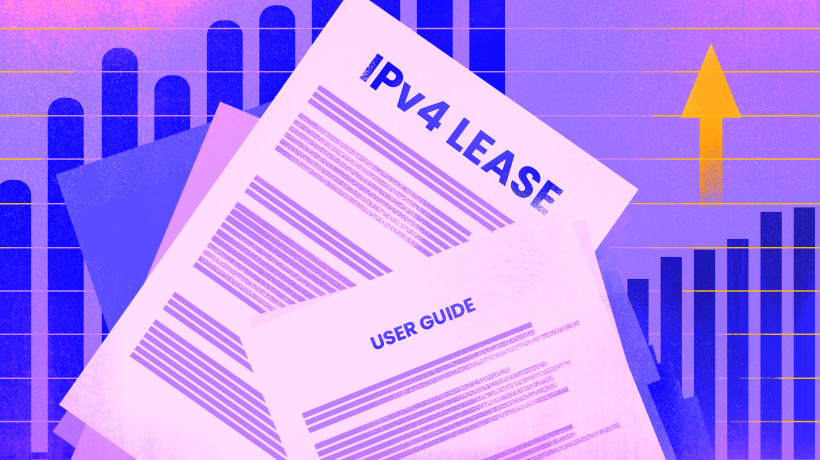
Are you looking for IPv4 addresses for your business? Have you decided to buy, or are you considering IPv4 lease?
Internet Protocol version 4 addresses are in high demand. They are also in low supply, which means they are not always easy to acquire. But there’s no need to panic because the booming IP leasing market now offers more opportunities than ever before to acquire IP space and use it to expand your network infrastructure.
Whether you provide hosting services, deal with online marketing or support your clients as an ISP (internet service provider), IP addresses empower you to scale your network and ensure a better experience for your end users. But how does leasing IPv4 compare to buying IPv4? What are the benefits? Which IP lease provider should you choose? Are there alternatives?
We’ve created this comprehensive guide on how to lease IPv4 addresses so that by the time you are done reading, you can confidently acquire IP resources through lease and maximize your business potential for inevitable growth.
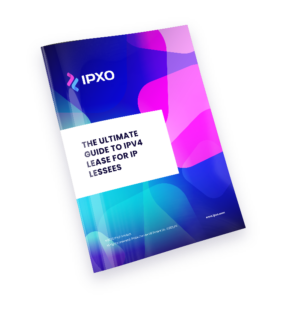
Save The Ultimate Guide to IPv4 Lease for IP Lessees for later
Fill out the form to download your FREE PDF

Why do businesses choose to lease IPv4?
Here’s the simple answer: Businesses lease IPv4 addresses due to sheer necessity. But, of course, things are a bit more nuanced than that. Let’s dive deeper into this intriguing topic.
Why did we run out of IPv4?
IP version 4 addressing was introduced in 1981, and the developers of this solution thought that 4,294,967,296 IPv4s would satisfy the need until a more advanced version of the IP emerged.
The 32-bit address space certainly seemed big enough in the 1980s when most households in the world did not yet have a single internet-connected device. However, by the end of the millennium, there were already 359 million internet users worldwide. Today, there are over 5.5 billion users, and each may have several internet-connected devices, every single one of which requires an IP address.
Although back in the 1980s and even early 1990s, companies, governments and educational institutions could get as many IPv4 addresses as they requested, the allocation of this resource changed once the digital world faced the first signs of IPv4 depletion.
In the mid-1990s, IP version 6 emerged, and it was meant to solve the IPv4 exhaustion problem accelerated by the growing number of internet users. The 128-bit alphanumeric addressing offers 340 undecillion (add 36 zeros) IP addresses. In theory, this should satisfy the demand for IPv6 indefinitely. So, why have we yet to transition fully to IPv6 in 2023?
In fact, big mobile services providers – for example, AT&T, Verizon or T-Mobile – have IPv6 deployed on a large scale. However, IPv6 adoption within other industries is slow. Why? Hardware limitations, considerable infrastructure costs and a lack of training and skills. Transitioning to IPv6, at this time, is a costly and time-consuming proposition.
Hence, we must make do with what we have and try to build a sustainable IP ecosystem with IPv4.
Can the internet be sustainable?
Download the FREE ‘Creating a Sustainable Internet Protocol Ecosystem’ White Paper
When did we start leasing unused IP addresses?
The Internet Assigned Numbers Authority (IANA) was tasked with allocating IP addresses in 1988. Between 1992-2004, five Regional Internet Registries (RIRs) emerged to further control the allocation of new IP addresses to Local Internet Registries (LIRs) within five geographical regions.
IANA officially allocated the last remaining unused IPv4 address blocks in 2011. RIRs were quick to deplete the unused resources as well. Both IANA and RIRs now mostly reclaim and reallocate unused IP addresses. However, the policies are strict, and most companies can only request small blocks of IP addresses once. Moreover, they must wait months and years to get them.
Of course, the expansion of the internet has not stopped just because IPv4 is depleted. In fact, it is estimated that around 20% of the entire IPv4 pool remains unused in the hands of IP address holders who got their IPs back in the 80s or 90s. However, these holders are not quick to release their unused assets. Instead of giving them back to RIRs, they now sell them. This kind of IPv4 market opened up in the early 2010s when major companies like Microsoft and Google started buying the IPv4 space.
Today, major corporations – most notably Amazon – continue to buy IPv4 addresses at high prices. Although smaller ISPs may be unable to compete with the buying power of hyperscalers, they now have the option to lease IP address blocks.
Top reasons behind the emergence of the IPv4 lease market:
- The IPv4 address pool was depleted as more users connected to the internet
- The adoption of IPv6, which was meant to replace IPv4, has not been as quick as expected
- The high demand and low supply of IPv4 inflated buying/selling prices
- Major internet providers are buying up unused IPv4 addresses at high prices, and smaller companies cannot compete
Lease IPv4 vs. buy IPv4: What are the most important things to consider?
Companies that need v4 IP addresses often assume that they need to be the holders of the said IPs. That is why the IPv4 buying/selling market continues to flourish. Although there are some pros to buying IP addresses – like gaining IP ownership rights – there are also some significant cons. And when we compare buying vs. leasing IPv4 addresses, there are quite a few things to consider.
So, why do companies choose to buy IPv4? As the resource is scarce but in high demand, companies often choose to invest in their own IP pools just to make sure that they can ensure stable services to their clients. Companies that hold IPv4 addresses are also solely responsible for managing them. However, while complete control might seem like a benefit, in many cases, that is a burden that not all companies can carry.
At the end of the day, companies need to hire professionals or dedicate time to train them. In either case – a costly venture. For many companies, that is an expense that could easily help acquire more IP addresses via leasing.
Furthermore, before companies can even start managing their own IP pools, they have to acquire IPv4 addresses, and that is not easy. As you now know, big companies with huge spending power are buying up IPs from holders who do not use them. In some cases, sellers are parting ways with bigger IP blocks – like /16s with 65,536 IPv4 addresses in each block. Smaller companies cannot cover the costs. Also, bigger buyers are likely to be able to offer better deals.
Brokers, transfers and waiting lists
Whether a company is big or small, they are likely to employ an IP address broker to find a seller or a buyer and negotiate the best terms. This also costs money. Furthermore, companies that want to participate in the IP transfer market – where one company transfers the rights to IPv4 addresses to another – often have to become RIR members. Each Local Internet Registry pays annual fees along with additional transfer fees.
Companies can also acquire the IP space without the assistance of brokers by joining an IPv4 waiting list. Not all RIRs have one, but the ones that do, cannot offer much. RIPE NCC members have to wait for more than a year at this point to acquire a single /24 allocation (256 IPv4 addresses). ARIN members also have to wait for more than a year, and the biggest size those eligible can request is a /22 block (1,024 IPv4 addresses). LACNIC members are in the worst position, as the last ones to join are likely to wait for their /22 allocations until 2029.
IPv4 lease benefits
The IP leasing market was built considering all the obstacles that companies in need of IP resources face. That includes all the obstacles that those wanting to buy IPv4s are dealing with as well. Overall, there are many great benefits to IPv4 leasing.
Top 7 IPv4 address space lease benefits
- Competitive IP block pricing: As more IP holders choose to monetize their unused resources to secure recurring revenue, the IP lease market has become self-regulating and can offer competitive pricing, as those offering higher prices are unlikely to outcompete those with lower prices
- Flexible commitments: When you buy IPs, you are obligated to take care of them until you sell, but if you lease, you can rent with a short-term or long-term commitment, and you can even negotiate custom lease terms for the best deals
- Instant availability of IPs: If the lease provider has an extensive pool of IPv4s, they can grant you near-instant access to IPs, and you can also provision them to any infrastructure without dealing with complicated transfer procedures
- Rich subnet availability: Top IP lease services providers will be able to offer access to IPv4 addresses from ARIN, RIPE NCC and all other RIRs, as well as subnets of varying sizes, meaning you will not be restricted in getting the IPs you require
- Transparent subnet validation: When you buy IPs, it can be a complicated process to check whether or not they are clean, but when it comes to leasing, a reliable provider will ensure that all subnets put up for lease are thoroughly checked and validated
- Professional IP abuse management: Besides ensuring that IPs are clean and secure to lease before they become available for lessees, the IP lease service provider should also offer professional IP address abuse management to offer some level of security with the help of thorough checks and monitoring
- Quick and painless process: Above all, IP leasing is a quick and convenient solution for those who do not want to pay RIR membership fees, join RIRs’ waitlists, work with brokers, cover high purchase costs or simply wait to get the IP block they require
Listen to this 6th RIR Podcast episode to learn more about the benefits and solutions IPv4 leasing offers for those dealing with IPv4 depletion.

How much is an IPv4 address?
The IPv4 price is $50 on average if you pay for addresses. $0.50 per month on average if you choose to lease instead. However, by the time you read this guide, it is quite likely that the prices will have changed. That is because the market is quite dynamic. To access the most up-to-date information on average IP lease prices, visit the IPXO Statistics hub.
Short IPv4 price history
While an IPv4 address is a constant that doesn’t change, the IPv4 price history is ever-changing. For a very long time, there was not much known about the deals that went on within the transfer market. However, big deals were publicized. Most likely, as a way for IP address brokers to promote their services.
One of the most famous deals dates back to 2011 when Microsoft employed a broker to acquire IPv4 addresses from Nortel. 666,624 legacy IPv4 addresses – meaning they were given to Nortel back when IPs were allocated freely – cost $7.5 million, which put a single IPv4 address at around $11.25. In 2011, this was a pretty steep price, indicating that big companies were able to buy IPv4 addresses at prices higher than the average. In 2011, the average per IPv4 address was around 5 US dollars.
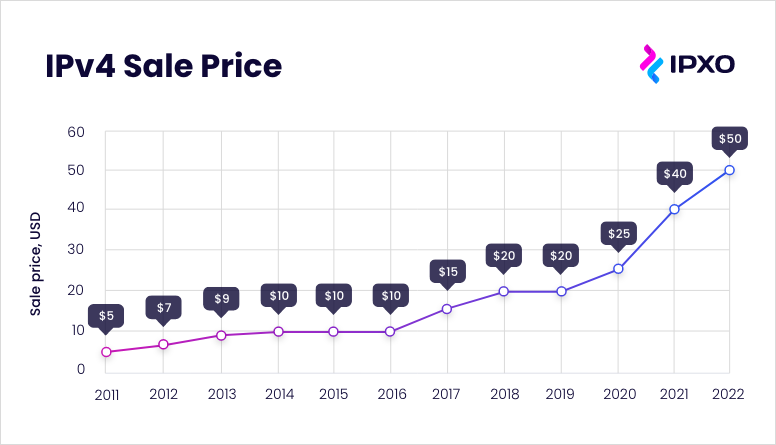
By 2016, the average rose to around $10. In 2017, the average price climbed to $15. In 2018-2020, the price seemed to have settled at around $15-$20. However, the global Covid-19 pandemic impacted the market considerably. Consequently, the prices jumped to $40 in 2021 and further increased to $50 in 2022.
As IPv4 lease prices directly correlate to IP sale prices, it is no surprise that the lease prices increased in the post-pandemic years as well. In 2014, the average price per IPv4 address was around $0.18 per month. Steadily, that rose to $0.42 per month by 2020. In 2021 and 2022, the prices leveled at around $0.50 and $0.47 per month.
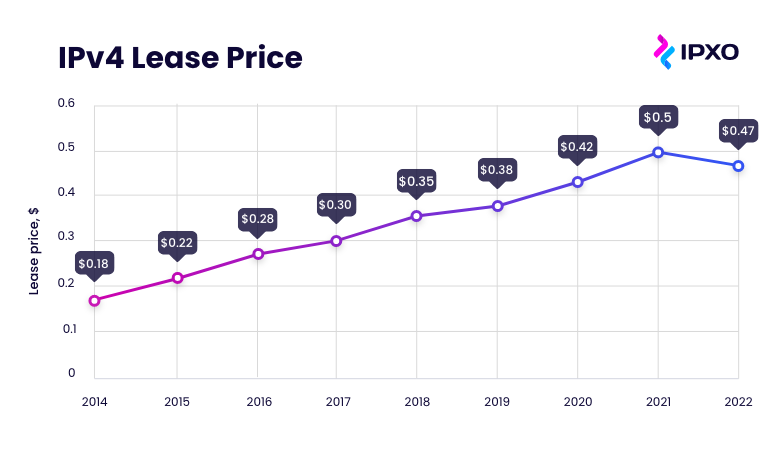
Calculating IPv4 prices
We know that the average price per IPv4 is $50 if you buy and around $0.50 if you lease. But how exactly does this translate to acquiring IP address blocks? It all comes down to the number of IP addresses in need.
When discussing IP numbers, we usually refer to subnets – segments of a network. A subnet mask – a number that distinguishes the network address and the host address within an IP address – represents a block of IPs. This is important because while an individual user needs one IP address, a company may require multiple blocks. While a smaller operation might require one or two blocks on a smaller scale, a large organization may need multiple blocks on a bigger scale to support all operations on the network.
The smallest subnet mask is a /32, and it has one single IP address. The largest mask is a /0, and it represents the entire global network – all 4,294,967,296 IP addresses. Of course, the IPv4 network is divided into more usable blocks. For example, IANA allocated /8s (16,777,216 IP addresses) to Regional Internet Registries. Today, most RIRs allocate /24, /23 and /22 blocks that contain 256, 512 and 1,024 IP addresses, respectively.
Check out our IPv4 subnet mask cheat sheet to learn more about subnet sizing.
Once you know the size of the IP block you require, it is easy to calculate how much it would cost to both buy and lease IP address blocks, as well as compare the difference.
Amount of IPs / Subnet
Buying price
(Upfront payment)
$11,520.00
Leasing price
(Recurring)
$145.92
IP address lease and the promise of cost-efficiency
So, how many addresses do you require? Let’s say you need a /24 block. If you decided to buy, you would need around $12,800 just to buy the IP addresses. That excludes all additional fees that you might need to cover to become an LIR, employ a broker and complete a transfer.
You also need to take into account the cost of managing the acquired IP addresses. This is more difficult to calculate. Because it entails hiring and training personnel as well as the cost of dealing with IP address abuse.
If you decided to lease the same block, you would have to pay around $146 per month or $1,752 annually. Of course, the lease price could change, but that may not affect lessees who sign long-term agreements with IP holders. Why? They commit to lease IPv4 blocks for a set period and a set price.
If we were to look at IP leasing purely from a financial perspective, you could lease a /24 block for seven years before you crossed the buying price. For many businesses that do not know what kinds of IP resources they might need in seven or more years, leasing truly is the perfect solution because lessees are free to enjoy the resources without fully committing to them.
How to choose an IP lease provider
As IP leasing is gaining trust within the internet community, and as more companies recognize the advantages of leasing the IP address space, more IP lease providers emerge. While the basic services each provider offers are pretty much the same – request and lease IPv4 addresses – all providers are unique, and some are simply better than others.
The most important things to consider when choosing an IP lease provider are:
- Pricing of the IP address space
- Subnet validation procedures
- Accessibility to subnets from Regional Internet Registries
- Rich availability of subnet sizes and geolocations
- IP address abuse management services
- Additional IP address management services
As companies often lease IPv4 addresses to grow their networks and expand their operations, business growth relies on the quality of services that the IP lease provider is able to offer. Of course, lessees can switch between providers. But it’s always best to pick one that you can establish a good relationship with from the get-go.
Note that not all providers can offer IPv4 addresses from all five RIRs, give access to IPs from various geolocations, ensure professional abuse management, verify the IPs put up for lease beforehand, or guarantee personalized care.
If you are interested in a full-service IP lease experience, join IPXO. The registration is free, the user verification process is quick, and we can offer the most comprehensive IP address lease experience. After all, the IPXO Marketplace is the world’s largest IP address lease & monetization platform, with a pool of more than 3 million IPv4 addresses ready for lessees.
Which companies benefit from leasing IP addresses?
At the end of the day, you may be asking whether or not IP lease is worth the trouble. While you have to be the one who comes to the final conclusion, many companies have already made their decisions.
Undeniably, every business in every industry might find different reasons to lease IPv4 addresses. But, for the most part, it all comes down to cost reduction and accessibility. As you now know, in today’s world, companies can no longer get as many IPv4 addresses as they need. And buying the resources is both an expensive and complicated process.
Nonetheless, IPv4 addresses remain crucial for maintaining and expanding business networks. Therefore, companies in dozens of industries continue to rely on them, including:
- Cloud services providers
- Content delivery network providers
- Cybersecurity companies
- Hosting providers
- Internet-of-Things businesses
- Internet service providers
Why do companies choose IP leasing?
Companies in various industries are able to expand their operations because they have found IP lease and can now enjoy access to as many IP addresses as they need. At a fraction of the cost that buying the IP address space entails.
This is not the only financial perk that IP lessees get to enjoy. Since they do not need to handle IPv4 address abuse management, they do not need to train or hire experts to do it for them. On the flip side, companies that buy IP addresses usually have to invest money in IPAM solutions and abuse control.
The cost savings generated through IP lease can be funneled into other areas of the business, helping create other opportunities for businesses to grow.
How to lease IP address space at IPXO
You can register a free account at IPXO using this easy-to-follow 6-step sign-up guide. Once your account is ready, you need to go through a quick one-time approval process to verify your business. To complete this, we ask to fill out a simple Declaration of Subnet Usage.
The declaration asks lessees whether or not they are GDPR compliant, if they send mail, if they have a designated abuse department, if they expect abuse incidents and several details about their business. Once the declaration is complete and we verify the business account, leasing can begin immediately.
Leasing IPv4 addresses via the IPXO Marketplace is easy and quite intuitive. If you know how many IP addresses you need exactly, you can search by subnet size. You can also search IP addresses by RIR, price and such advanced filters as location, reservation ID or octet. You can even filter the search results by subnets whose holders wish to negotiate custom lease terms.
Use our quick 5-step IP lease guide or watch the video below to learn how easy it is to lease IPv4 addresses.
To sum up, leasing IPv4 addresses is no longer a mysterious or suspicious proposition, which was the case not too long ago. Today, more and more companies are discovering endless benefits.
Whether you want to lease short-term or long-term. Or you want to expand your global network and take your operations to other regions or lease a few small blocks. Whether you operate networks of data centers or need some extra IP space that can be deployed quickly. We can offer you it all, along with extensive IP address management services, 24/7 support and custom solutions.
Register your account, pass a simple verification process, lease IP addresses within 5 minutes and bring them to any infrastructure within 24 hours. Leasing IPv4 has never been this easy!
Ready to lease IPv4?
Register your free account today!
About the author
Table of contents
Why do businesses choose to lease IPv4?
Why did we run out of IPv4?
When did we start leasing unused IP addresses?
Lease IPv4 vs. buy IPv4: What are the most important things to consider?
Brokers, transfers and waiting lists
IPv4 lease benefits
Top 7 IPv4 address space lease benefits
How much is an IPv4 address?
Short IPv4 price history
Calculating IPv4 prices
IP address lease and the promise of cost-efficiency
How to choose an IP lease provider
Which companies benefit from leasing IP addresses?
Why do companies choose IP leasing?
How to lease IP address space at IPXO
Related reading

Top 10 Benefits of Leasing IP Addresses for IP Holders
Explore the top 10 benefits of leasing IP addresses with IPXO. Maximize income, protect your IP resources, and gain full control.
Read more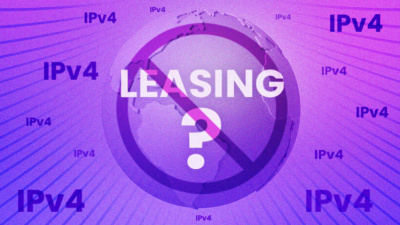
Opinion: IP Leasing Should Become a Market Standard
Learn why IPv4 leasing should become a market standard, which would bring many benefits in a more competitive environment, leading to additional revenue for all parties involved.
Read more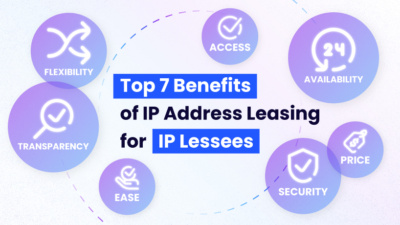
Top 7 Benefits of IP Address Leasing for IP Lessees
Why do more and more companies choose to lease IPv4 resources instead of buying them? There are several significant benefits that these companies have discovered.
Read moreSubscribe to the IPXO email and don’t miss any news!


